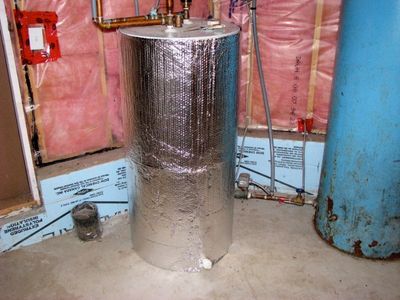
Winterize Your Water Heater
The home’s water heater is one of the most important pieces of home plumbing hardware. It’s responsible for providing the house with hot water on demand for showering, bathing, cooking, and cleaning. In this blog post, professional plumbers share insight on how water heater insulation can save homeowners money during the winter and how to determine if a water heater needs additional insulation.
Save Money On Water Heating Costs
The water heater is often located in a home's basement or garage, where it could be exposed to freezing temperatures during the coldest months of the year. Protecting the home’s water heater with additional insulation can keep heat from escaping so that homeowners do not waste money on their energy bills.
Standby heat loss can cost homeowners a lot of money during the winter. The hot water tank contains gallons of hot water for the homeowner to use for bathing, washing clothes, and other important household tasks. When the temperatures drop low in the winter, the hot water heater may have to work twice as hard to keep the water inside warm.
Insulating the water heater to help maintain a consistent temperature can reduce utility bills. In addition to the savings, homeowners can feel good about reducing their home’s carbon emissions. Cutting back on water heater costs can help homeowners to save money for the things that matter most.
Some Water Heaters Need Extra Insulation
New water heaters are engineered to be more insulated and energy efficient than ever, so some new water heaters may not require extra insulation. The best way to determine if a water heater needs additional insulation is by checking the R-value on the tank. The R-value of a water heater is a unit of measurement that industry professionals use to describe how well-insulated the material is.
Some water heaters have better insulation than others. An R-value under 24 indicates that the water heater needs added insulation to promote more efficient performance. The higher the R-value, the better the insulation. Homeowners can typically find the water heater's R-value by looking at the product sticker or manual.
Methods of Insulating Water Heaters
 The most common method for insulating a water heater is buying a water heater blanket. Water heater blanket kits can be purchased at local hardware stores, or homeowners can call a professional. Having an experienced water heater technician winterize the water heater will also allow them to inspect it for signs of damage like leaks and corrosion. Water heater blankets are typically made out of very lightweight aluminum. Homeowners may want to add insulation in the space beneath the heater as well.
The most common method for insulating a water heater is buying a water heater blanket. Water heater blanket kits can be purchased at local hardware stores, or homeowners can call a professional. Having an experienced water heater technician winterize the water heater will also allow them to inspect it for signs of damage like leaks and corrosion. Water heater blankets are typically made out of very lightweight aluminum. Homeowners may want to add insulation in the space beneath the heater as well.
Insulating the water heater properly before the coldest months of the year can help homeowners save a lot of money. Several materials can be used to insulate a water heater, and each has its advantages. Fiberglass and foam insulation are two of the most common materials used for water heater insulation. Fiberglass insulation is a lightweight material that provides good thermal insulation and won't settle or compress over time. It's also relatively easy to install and can help regulate the temperature of a water heater.
Foam insulation is more expensive than fiberglass, but it can provide more effective insulation, creating an airtight seal around the water heater. Foam is also easier to install and can be used in hard-to-reach spaces, such as corners and tight spots. Whichever material homeowners choose, be sure to follow the manufacturer's instructions for proper installation and maintenance to get the most out of water heater insulation.
Paul The Plumber
Paul The Plumber has over 20 years of experience serving Derry, NH, and the surrounding areas. They provide honest prices, extended warranties, and financing. Call them today for water heater services in Derry, NH.
Distribution Links +
- htv10.tv
- wicz.com
- snntv.com
- central.newschannelnebraska.com
- metro.newschannelnebraska.com
- midplains.newschannelnebraska.com
- northeast.newschannelnebraska.com
- plattevalley.newschannelnebraska.com
- panhandle.newschannelnebraska.com
- wpgxfox28.com
- lifestyle.mykmlk.com
- wtnzfox43.com
- lifestyle.3wzfm.com
- lifestyle.southernsportstoday.com
- lifestyle.thepodcastpark.com
- lifestyle.680thefan.com
- lifestyle.xtra1063.com
- lifestyle.953hlf.com
- lifestyle.rewind1019.com
- lifestyle.us983.com
- lifestyle.countrylegends1059.com
- lifestyle.967wshv.com
- lifestyle.1045thedan.com
- yournewsnet.com
- michigan.yournewsnet.com
- midwest.yournewsnet.com
- northeast.yournewsnet.com
- southeast.yournewsnet.com
- southwest.yournewsnet.com
- lifestyle.earl983.com
- west.yournewsnet.com
- lifestyle.maverick1023.com
- lifestyle.magic979wtrg.com
- lifestyle.1077lakefm.com



